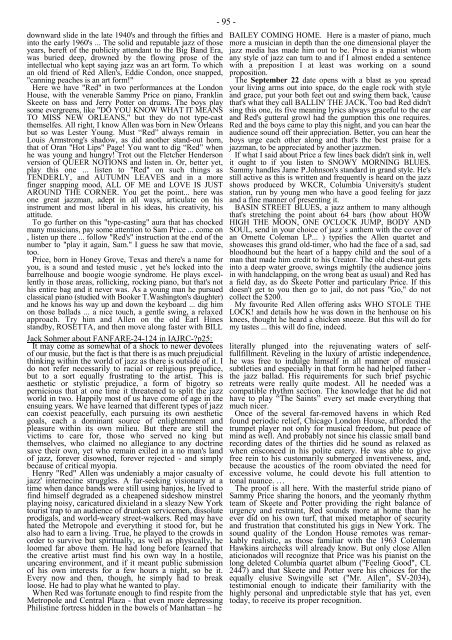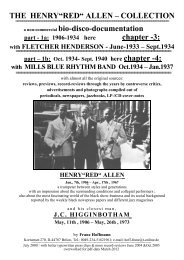Red Allen Chapters 9 - The Jazz Archive
Red Allen Chapters 9 - The Jazz Archive
Red Allen Chapters 9 - The Jazz Archive
Create successful ePaper yourself
Turn your PDF publications into a flip-book with our unique Google optimized e-Paper software.
downward slide in the late 1940's and through the fifties and<br />
into the early 1960's ... <strong>The</strong> solid and reputable jazz of those<br />
years, bereft of the publicity attendant to the Big Band Era,<br />
was buried deep, drowned by the flowing prose of the<br />
intellectual who kept saying jazz was an art form. To which<br />
an old friend of <strong>Red</strong> <strong>Allen</strong>'s, Eddie Condon, once snapped,<br />
"canning peaches is an art form!"<br />
Here we have "<strong>Red</strong>" in two performances at the London<br />
House, with the venerable Sammy Price on piano, Franklin<br />
Skeete on bass and Jerry Potter on drums. <strong>The</strong> boys play<br />
some evergreens, like "DO YOU KNOW WHAT IT MEANS<br />
TO MISS NEW ORLEANS," but they do not type-cast<br />
themselfes. All right, I know <strong>Allen</strong> was born in New Orleans<br />
but so was Lester Young. Must “<strong>Red</strong>” always remain in<br />
Louis Armstrong's shadow, as did another stand-out horn,<br />
that of Oran "Hot Lips" Page! You want to dig “<strong>Red</strong>” when<br />
he was young and hungry! Trot out the Fletcher Henderson<br />
version of QUEER NOTIONS and listen in. Or, better yet,<br />
play this one ... listen to "<strong>Red</strong>" on such things as<br />
TENDERLY, and AUTUMN LEAVES and in a more<br />
finger snapping mood, ALL OF ME and LOVE IS JUST<br />
AROUND THE CORNER. You get the point... here was<br />
one great jazzman, adept in all ways, articulate on his<br />
instrument and most liberal in his ideas, his creativity, his<br />
attitude.<br />
To go further on this "type-casting" aura that has chocked<br />
many musicians, pay some attention to Sam Price ... come on<br />
, listen up there ... follow "<strong>Red</strong>'s" instruction at the end of the<br />
number to "play it again, Sam." I guess he saw that movie,<br />
too.<br />
Price, born in Honey Grove, Texas and there's a name for<br />
you, is a sound and tested music , yet he's locked into the<br />
barrelhouse and boogie woogie syndrome. He plays excellently<br />
in those areas, rollicking, rocking piano, but that's not<br />
his entire bag and it never was. As a young man he pursued<br />
classical piano (studied with Booker T.Washington's daughter)<br />
and he knows his way up and down the keyboard ... dig him<br />
on those ballads ... a nice touch, a gentle swing, a relaxed<br />
approach. Try him and <strong>Allen</strong> on the old Earl Hines<br />
standby, ROSETTA, and then move along faster with BILL<br />
Jack Sohmer about FANFARE-24-124 in IAJRC-?p25:<br />
It may come as somewhat of a shock to newer devotees<br />
of our music, but the fact is that there is as much prejudicial<br />
thinking within the world of jazz as there is outside of it. I<br />
do not refer necessarily to racial or religious prejudice,<br />
but to a sort equally frustrating to the artist. This is<br />
aesthetic or stylistic prejudice, a form of bigotry so<br />
pernicious that at one time it threatened to split the jazz<br />
world in two. Happily most of us have come of age in the<br />
ensuing years. We have learned that different types of jazz<br />
can coexist peacefully, each pursuing its own aesthetic<br />
goals, each a dominant source of enlightenment and<br />
pleasure within its own milieu. But there are still the<br />
victims to care for, those who served no king but<br />
themselves, who claimed no allegiance to any doctrine<br />
save their own, yet who remain exiled in a no man's land<br />
of jazz, forever disowned, forever rejected - and simply<br />
because of critical myopia.<br />
Henry "<strong>Red</strong>" <strong>Allen</strong> was undeniably a major casualty of<br />
jazz' internecine struggles. A far-seeking visionary at a<br />
time when dance bands were still using banjos, he lived to<br />
find himself degraded as a cheapened sideshow minstrel<br />
playing noisy, caricatured dixieland in a sleazy New York<br />
tourist trap to an audience of drunken servicemen, dissolute<br />
prodigals, and world-weary street-walkers. <strong>Red</strong> may have<br />
hated the Metropole and everything it stood for, but he<br />
also had to earn a living. True, he played to the crowds in<br />
order to survive but spiritually, as well as physically, he<br />
loomed far above them. He had long before learned that<br />
the creative artist must find his own way In a hostile,<br />
uncaring environment, and if it meant public submission<br />
of his own interests for a few hours a night, so be it.<br />
Every now and then, though, he simply had to break<br />
loose. He had to play what he wanted to play.<br />
When <strong>Red</strong> was fortunate enough to find respite from the<br />
Metropole and Central Plaza - that even more depressing<br />
Philistine fortress hidden in the bowels of Manhattan – he<br />
- 95 -<br />
BAILEY COMING HOME. Here is a master of piano, much<br />
more a musician in depth than the one dimensional player the<br />
jazz media has made him out to be. Price is a pianist whom<br />
any style of jazz can turn to and if I almost ended a sentence<br />
with a preposition I at least was working on a sound<br />
proposition.<br />
<strong>The</strong> September 22 date opens with a blast as you spread<br />
your living arms out into space, do the eagle rock with style<br />
and grace, put your both feet out and swing them back, 'cause<br />
that's what they call BALLIN' THE JACK. Too bad <strong>Red</strong> didn't<br />
sing this one, its five meaning lyrics always graceful to the ear<br />
and <strong>Red</strong>'s gutteral growl had the gumption this one requires.<br />
<strong>Red</strong> and the boys came to play this night, and you can hear the<br />
audience sound off their appreciation. Better, you can hear the<br />
boys urge each other along and that's the best praise for a<br />
jazzman, to be appreciated by another jazzmen.<br />
If what I said about Price a few lines back didn't sink in, well<br />
it ought to if you listen to SNOWY MORNING BLUES.<br />
Sammy handles Jame P.Johnson's standard in grand style. He's<br />
still active as this is written and frequently is heard on the jazz<br />
shows produced by WKCR, Columbia University's student<br />
station, run by young men who have a good feeling for jazz<br />
and a fine manner of presenting it.<br />
BASIN STREET BLUES, a jazz anthem to many although<br />
that's stretching the point about 64 bars (how about HOW<br />
HIGH THE MOON, ONE O'CLOCK JUMP, BODY AND<br />
SOUL, send in your choice of jazz´s anthem with the cover of<br />
an Ornette Coleman LP... ) typifies the <strong>Allen</strong> quartet and<br />
showcases this grand old-timer, who had the face of a sad, sad<br />
bloodhound but the heart of a happy child and the soul of a<br />
man that made him credit to his Creator. <strong>The</strong> old chest-nut gets<br />
into a deep water groove, swings mightily (the audience joins<br />
in with handclapping, on the wrong beat as usual) and <strong>Red</strong> has<br />
a field day, as do Skeete Potter and particulary Price. If this<br />
doesn't get to you then go to jail, do not pass "Go," do not<br />
collect the $200.<br />
My favourite <strong>Red</strong> <strong>Allen</strong> offering asks WHO STOLE THE<br />
LOCK! and details how he was down in the henhouse on his<br />
knees, thought he heard a chicken sneeze. But this will do for<br />
my tastes ... this will do fine, indeed.<br />
literally plunged into the rejuvenating waters of selffullfillment.<br />
Reveling in the luxury of artistic independence,<br />
he was free to indulge himself in all manner of musical<br />
subtleties and especially in that form he had helped father -<br />
the jazz ballad. His requirements for such brief psychic<br />
retreats were really quite modest. All he needed was a<br />
compatible rhythm section. <strong>The</strong> knowledge that he did not<br />
have to play “<strong>The</strong> Saints” every set made everything that<br />
much nicer.<br />
Once of the several far-removed havens in which <strong>Red</strong><br />
found periodic relief, Chicago London House, afforded the<br />
trumpet player not only for musical freedom, but peace of<br />
mind as well. And probably not since his classic small band<br />
recording dates of the thirties did he sound as relaxed as<br />
when ensconced in his polite eatery. He was able to give<br />
free rein to his customarily submerged inventiveness, and,<br />
because the acoustics of the room obviated the need for<br />
excessive volume, he could devote his full attention to<br />
tonal nuance. …<br />
<strong>The</strong> proof is all here. With the masterful stride piano of<br />
Sammy Price sharing the honors, and the yeomanly rhythm<br />
team of Skeete and Potter providing the right balance of<br />
urgency and restraint, <strong>Red</strong> sounds more at home than he<br />
ever did on his own turf, that mixed metaphor of security<br />
and frustration that constituted his gigs in New York. <strong>The</strong><br />
sound quality of the London House remotes was remarkably<br />
realistic, as those familiar with the 1963 Coleman<br />
Hawkins airchecks will already know. But only close <strong>Allen</strong><br />
aticionados will recognize that Price was his pianist on the<br />
long deleted Columbia quartet album ("Feeling Good", CL<br />
2447) and that Skeete and Potter were his choices for the<br />
equally elusive Swingville set ("Mr. <strong>Allen</strong>", SV-2034),<br />
testimonial enough to indicate their familiarity with the<br />
highly personal and unpredictable style that has yet, even<br />
today, to receive its proper recognition.



